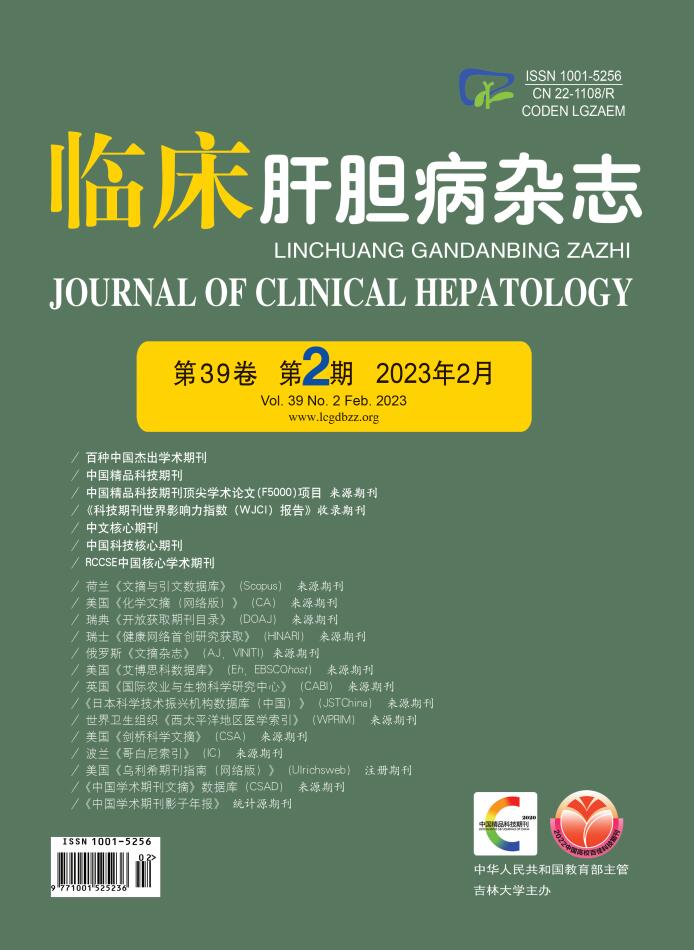| [1] |
BERTUCCIO P, MALVEZZI M, CARIOLI G, et al. Global trends in mortality from intrahepatic and extrahepatic cholangiocarcinoma[J]. J Hepatol, 2019, 71(1): 104-114. DOI: 10.1016/j.jhep.2019.03.013. |
| [2] |
VALLE J, WASAN H, PALMER DH, et al. Cisplatin plus gemcitabine versus gemcitabine for biliary tract cancer[J]. N Engl J Med, 2010, 362(14): 1273-1281. DOI: 10.1056/NEJMoa0908721. |
| [3] |
|
| [4] |
|
| [5] |
RHEE I. Diverse macrophages polarization in tumor microenvironment[J]. Arch Pharm Res, 2016, 39(11): 1588-1596. DOI: 10.1007/s12272-016-0820-y. |
| [6] |
ZHOU M, WANG C, LU S, et al. Tumor-associated macrophages in cholangiocarcinoma: complex interplay and potential therapeutic target[J]. EBio Medicine, 2021, 67: 103375. DOI: 10.1016/j.ebiom.2021.103375. |
| [7] |
RAGGI C, CORRENTI M, SICA A, et al. Cholangiocarcinoma stem-like subset shapes tumor-initiating niche by educating associated macrophages[J]. J Hepatol, 2017, 66(1): 102-115. DOI: 10.1016/j.jhep.2016.08.012. |
| [8] |
TRIPATHI C, TEWARI BN, KANCHAN RK, et al. Macrophages are recruited to hypoxic tumor areas and acquire a pro-angiogenic M2-polarized phenotype via hypoxic cancer cell derived cytokines Oncostatin M and Eotaxin[J]. Oncotarget, 2014, 5(14): 5350-5368. DOI: 10.18632/oncotarget.2110. |
| [9] |
CHEN X, SONG E. Turning foes to friends: targeting cancer-associated fibroblasts[J]. Nat Rev Drug Discov, 2019, 18(2): 99-115. DOI: 10.1038/s41573-018-0004-1. |
| [10] |
ZIANI L, CHOUAIB S, THIERY J. Alteration of the antitumor immune response by cancer-associated fibroblasts[J]. Front Immunol, 2018, 9: 414. DOI: 10.3389/fimmu.2018.00414. |
| [11] |
LEONE RD, POWELL JD. Metabolism of immune cells in cancer[J]. Nat Rev Cancer, 2020, 20(9): 516-531. DOI: 10.1038/s41568-020-0273-y. |
| [12] |
HAYES CS, SHICORA AC, KEOUGH MP, et al. Polyamine-blocking therapy reverses immunosuppression in the tumor microenvironment[J]. Cancer Immunol Res, 2014, 2(3): 274-285. DOI: 10.1158/2326-6066.CIR-13-0120-T. |
| [13] |
WHITESIDE TL. What are regulatory T cells (Treg) regulating in cancer and why?[J]. Semin Cancer Biol, 2012, 22(4): 327-334. DOI: 10.1016/j.semcancer.2012.03.004. |
| [14] |
VIVIER E, UGOLINI S, BLAISE D, et al. Targeting natural killer cells and natural killer T cells in cancer[J]. Nat Rev Immunol, 2012, 12(4): 239-252. DOI: 10.1038/nri3174. |
| [15] |
HASITA H, KOMOHARA Y, OKABE H, et al. Significance of alternatively activated macrophages in patients with intrahepatic cholangiocarcinoma[J]. Cancer Sci, 2010, 101(8): 1913-1919. DOI: 10.1111/j.1349-7006.2010.01614.x. |
| [16] |
PERUGORRIA MJ, OLAIZOLA P, LABIANO I, et al. Wnt-β-catenin signalling in liver development, health and disease[J]. Nat Rev Gastroenterol Hepatol, 2019, 16(2): 121-136. DOI: 10.1038/s41575-018-0075-9. |
| [17] |
LOILOME W, BUNGKANJANA P, TECHASEN A, et al. Activated macrophages promote Wnt/β-catenin signaling in cholangiocarcinoma cells[J]. Tumour Biol, 2014, 35(6): 5357-5367. DOI: 10.1007/s13277-014-1698-2. |
| [18] |
BOULTER L, GUEST RV, KENDALL TJ, et al. WNT signaling drives cholangiocarcinoma growth and can be pharmacologically inhibited[J]. J Clin Invest, 2015, 125(3): 1269-1285. DOI: 10.1172/JCI76452. |
| [19] |
CHEN S, CHEN Z, LI Z, et al. Tumor-associated macrophages promote cholangiocarcinoma progression via exosomal Circ_0020256[J]. Cell Death Dis, 2022, 13(1): 94. DOI: 10.1038/s41419-022-04534-0. |
| [20] |
SUBIMERB C, PINLAOR S, LULITANOND V, et al. Circulating CD14(+) CD16(+) monocyte levels predict tissue invasive character of cholangiocarcinoma[J]. Clin Exp Immunol, 2010, 161(3): 471-479. DOI: 10.1111/j.1365-2249.2010.04200.x. |
| [21] |
HENZE AT, MAZZONE M. The impact of hypoxia on tumor-associated macrophages[J]. J Clin Invest, 2016, 126(10): 3672-3679. DOI: 10.1172/JCI84427. |
| [22] |
SUN D, LUO T, DONG P, et al. M2-polarized tumor-associated macrophages promote epithelial-mesenchymal transition via activation of the AKT3/PRAS40 signaling pathway in intrahepatic cholangiocarcinoma[J]. J Cell Biochem, 2020, 121(4): 2828-2838. DOI: 10.1002/jcb.29514. |
| [23] |
TECHASEN A, LOILOME W, NAMWAT N, et al. Cytokines released from activated human macrophages induce epithelial mesenchymal transition markers of cholangiocarcinoma cells[J]. Asian Pac J Cancer Prev, 2012, 13(Suppl): 115-118.
|
| [24] |
KITANO Y, OKABE H, YAMASHITA YI, et al. Tumour-infiltrating inflammatory and immune cells in patients with extrahepatic cholangiocarcinoma[J]. Br J Cancer, 2018, 118(2): 171-180. DOI: 10.1038/bjc.2017.401. |
| [25] |
SICA A, LARGHI P, MANCINO A, et al. Macrophage polarization in tumour progression[J]. Semin Cancer Biol, 2008, 18(5): 349-355. DOI: 10.1016/j.semcancer.2008.03.004. |
| [26] |
EL-GAMAL MI, AL-AMEEN SK, AL-KOUMI DM, et al. Recent advances of colony-stimulating factor-1 receptor (CSF-1R) kinase and its inhibitors[J]. J Med Chem, 2018, 61(13): 5450-5466. DOI: 10.1021/acs.jmedchem.7b00873. |
| [27] |
MACDONALD KP, PALMER JS, CRONAU S, et al. An antibody against the colony-stimulating factor 1 receptor depletes the resident subset of monocytes and tissue- and tumor-associated macrophages but does not inhibit inflammation[J]. Blood, 2010, 116(19): 3955-3963. DOI: 10.1182/blood-2010-02-266296. |
| [28] |
PYONTECK SM, AKKARI L, SCHUHMACHER AJ, et al. CSF-1R inhibition alters macrophage polarization and blocks glioma progression[J]. Nat Med, 2013, 19(10): 1264-1272. DOI: 10.1038/nm.3337. |
| [29] |
YOSHIMURA T. The chemokine MCP-1 (CCL2) in the host interaction with cancer: a foe or ally?[J]. Cell Mol Immunol, 2018, 15(4): 335-345. DOI: 10.1038/cmi.2017.135. |
| [30] |
DWYER BJ, JARMAN EJ, GOGOI-TIWARI J, et al. TWEAK/Fn14 signalling promotes cholangiocarcinoma niche formation and progression[J]. J Hepatol, 2021, 74(4): 860-872. DOI: 10.1016/j.jhep.2020.11.018. |
| [31] |
LOGTENBERG M, SCHEEREN FA, SCHUMACHER TN. The CD47-SIRPα immune checkpoint[J]. Immunity, 2020, 52(5): 742-752. DOI: 10.1016/j.immuni.2020.04.011. |
| [32] |
VAETEEWOOTTACHARN K, KARIYA R, POTHIPAN P, et al. Attenuation of CD47-SIRPα signal in cholangiocarcinoma potentiates tumor-associated macrophage-mediated phagocytosis and suppresses intrahepatic metastasis[J]. Transl Oncol, 2019, 12(2): 217-225. DOI: 10.1016/j.tranon.2018.10.007. |
| [33] |
SHARPE AH, PAUKEN KE. The diverse functions of the PD1 inhibitory pathway[J]. Nat Rev Immunol, 2018, 18(3): 153-167. DOI: 10.1038/nri.2017.108. |
| [34] |
LOEUILLARD E, YANG J, BUCKARMA E, et al. Targeting tumor-associated macrophages and granulocytic myeloid-derived suppressor cells augments PD-1 blockade in cholangiocarcinoma[J]. J Clin Invest, 2020, 130(10): 5380-5396. DOI: 10.1172/JCI137110. |








 DownLoad:
DownLoad: